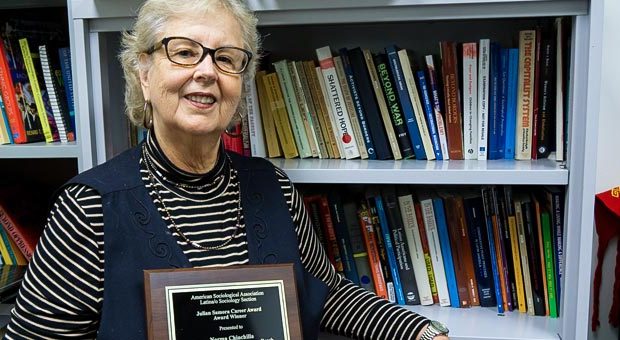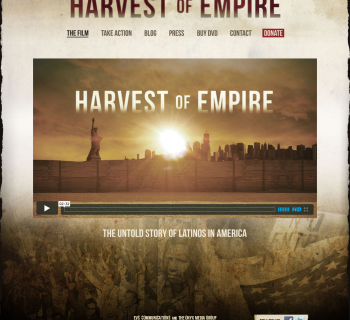Winning awards is nothing new for Norma Chinchilla, a Sociology and Women’s Gender and Sexuality Studies professor at CSULB. However, the Julian Samora Distinguished Award was a different type of win, a collaborative effort by those influenced by her, and ultimately a win for the future sociologists following in her footsteps of using interdisciplinary frameworks and opening up new areas of research and teaching.
Named after the first Mexican-American who obtained a Ph.D. in Sociology, the Julian Samora Distinguished Award from the American Sociological Association is somewhat new and generally awarded to a more dominant genre in the Latino/Latina studies. Chinchilla has helped to expand that to include what is now being called Central American Studies.
“At first I didn’t want to be nominated for this award,” Chinchilla said. “But then I realized that this could mean something to other people coming behind me and encourage them. That’s what my younger colleagues talked me into when they said, ‘It isn’t for you it’s for us’ and that applied to my values of social change.”
Chinchilla has always done things a little differently. Her grandparents were immigrants from Germany and, although she grew up more or less middle class, those immigrant values were strong in her family. Her parents supported her education but preferred she do something more practical. Subsequently, she knew that if she wanted to continue on after earning her B.A., she was going to have to make it on her own.
“I tell my students about different times that things have happened to me,” Chinchilla said. “There were things that set me back and made me doubt myself, but sometimes if you plant enough seeds, remain persistent and work hard, some of those seeds may grow into beautiful trees.”
Although Chinchilla didn’t always share her personal challenges and life experiences with her students, she later discovered that they learned from them.
“When I was first a young faculty member, the way that I had been trained was to not bring in what would be considered our ‘personal life’ into the classroom,” Chinchilla said. “For some reason I thought that meant you shouldn’t tell students about your challenges or awards–I don’t know why, but for a long time I thought that wasn’t professional.”
When Chinchilla started teaching in the early 1970s, it was a time for groundbreaking events–Watergate, the Vietnam War, “Jaws”, Title IX and the wave of feminism. That was also the time she discovered the joys of learning with her students as well as teaching them.
“In my first teaching job in a small liberal arts college, students came to us wanting a course on women, but none of the faculty had classes like that in school. These students came and said, ‘We want to learn about this new thing called feminism,’” Chinchilla recalled. “The other faculty and I said the same thing–that we’re not trained in that, we don’t know anything about it–but the students said, ‘That’s ok; we can teach the course together.’”
The class would read now famous books like Sisterhood is Powerful and other early feminist texts together, and that is when Chinchilla realized that although academic training is important, it is equally important to continue learning; that included from the students themselves.
After having taught at a liberal arts college and a Research I university, she believes that CSULB is an important key to the success in the research, teaching and activism that has led to her awards. Chinchilla said that what she loves most about being at CSULB is her students.
“They are wonderful and they really appreciate me and the rest of the faculty in my department,” she said. “Many of them are first-generation college students or traditionally underrepresented students, and although they may be juggling many things and they may not come to class totally prepared because they were working late last night, they are still eager and respectful, and they really want to succeed.”
Chinchilla also credits CSULB for having allowed her to do the type of research that she wants to do, and in the way that she wants to do it.
“As sociologists we are always saying that we need to make the invisible visible and I now realize that one of the ways we do that is through awards. Some awards are phony, but some awards are real and I felt this award was a real one,” she said. “I loved getting this award because it meant that my mentoring of younger faculty on and off campus has had an impact. It also means that the Latina/o studies section in my discipline of sociology was willing to include new and changing realities. And the memory of those difficult times fades into the distance and those sacrifices now seem worthwhile.”







